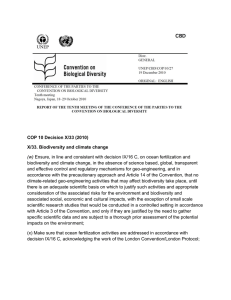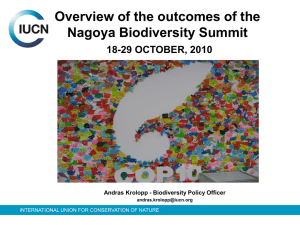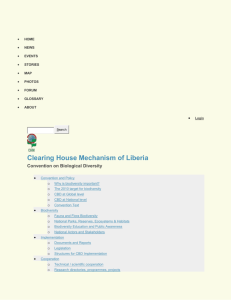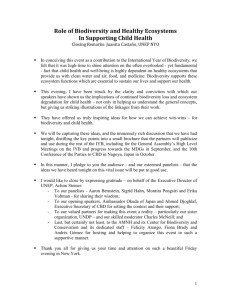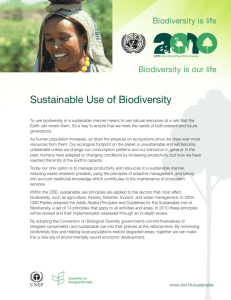Document 11973627
advertisement
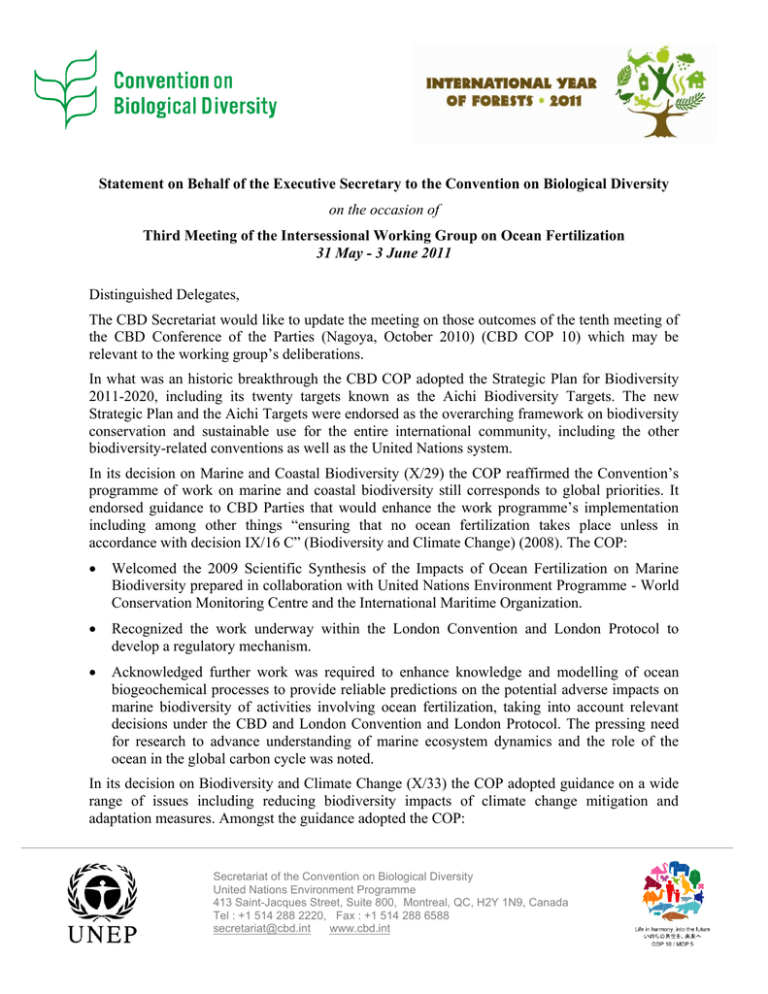
Statement on Behalf of the Executive Secretary to the Convention on Biological Diversity on the occasion of Third Meeting of the Intersessional Working Group on Ocean Fertilization 31 May - 3 June 2011 Distinguished Delegates, The CBD Secretariat would like to update the meeting on those outcomes of the tenth meeting of the CBD Conference of the Parties (Nagoya, October 2010) (CBD COP 10) which may be relevant to the working group’s deliberations. In what was an historic breakthrough the CBD COP adopted the Strategic Plan for Biodiversity 2011-2020, including its twenty targets known as the Aichi Biodiversity Targets. The new Strategic Plan and the Aichi Targets were endorsed as the overarching framework on biodiversity conservation and sustainable use for the entire international community, including the other biodiversity-related conventions as well as the United Nations system. In its decision on Marine and Coastal Biodiversity (X/29) the COP reaffirmed the Convention’s programme of work on marine and coastal biodiversity still corresponds to global priorities. It endorsed guidance to CBD Parties that would enhance the work programme’s implementation including among other things “ensuring that no ocean fertilization takes place unless in accordance with decision IX/16 C” (Biodiversity and Climate Change) (2008). The COP: Welcomed the 2009 Scientific Synthesis of the Impacts of Ocean Fertilization on Marine Biodiversity prepared in collaboration with United Nations Environment Programme - World Conservation Monitoring Centre and the International Maritime Organization. Recognized the work underway within the London Convention and London Protocol to develop a regulatory mechanism. Acknowledged further work was required to enhance knowledge and modelling of ocean biogeochemical processes to provide reliable predictions on the potential adverse impacts on marine biodiversity of activities involving ocean fertilization, taking into account relevant decisions under the CBD and London Convention and London Protocol. The pressing need for research to advance understanding of marine ecosystem dynamics and the role of the ocean in the global carbon cycle was noted. In its decision on Biodiversity and Climate Change (X/33) the COP adopted guidance on a wide range of issues including reducing biodiversity impacts of climate change mitigation and adaptation measures. Amongst the guidance adopted the COP: Secretariat of the Convention on Biological Diversity United Nations Environment Programme 413 Saint-Jacques Street, Suite 800, Montreal, QC, H2Y 1N9, Canada Tel : +1 514 288 2220, Fax : +1 514 288 6588 secretariat@cbd.int www.cbd.int Reiterated that no climate-related geo-engineering activities that may affect biodiversity should take place until there is an adequate scientific basis to justify such activities and appropriate consideration of the associated risks. Small scale scientific research studies conducted in a controlled setting could be excepted if justified by the need to gather specific scientific data and subject to a thorough prior assessment of the potential impacts on the environment. Acknowledged the work of the London Convention/London Protocol on ocean fertilization. As a follow up to these decisions, a mini-workshop on biodiversity and geo-engineering will take place on 10 June 2011 in the margins of the UNFCCC climate change meetings in Bonn. Furthermore, a Liaison Group Meeting on Climate-Related Geo-Engineering as it relates to the CBD will take place in London (29 June - 1 July 2011). The outcomes of these meetings will be discussed at the sixteenth meeting of the Subsidiary Body on Scientific, Technical and Technological Advice to be held in March, 2012. The final report of COP 10 is available on the CBD website at: < http://www.cbd.int/doc/meetings/cop/cop-10/official/cop-10-27-en.pdf >. Thank you for your attention.
